[Note: Cross-Posted at my tumblr Endeavor's Reward, which focuses on adapting Final Fantasy Tactics to novel form. Please forgive any formatting errors due to the cross-post.]
I’d originally intended to write something like this closer to the release of Final Fantasy XII: The Zodiac Age, but I actually had someone reply to this tumblr with a request for it (thanks, @beeperdoop-hiatus ) so I’m doing to do this now and reblog it later.
It can be really tiring hearing people repeat the same tired criticisms of FFXII’s story. As a particular fan of that game, I wanted to clarify some details on that score. Let’s get into it.
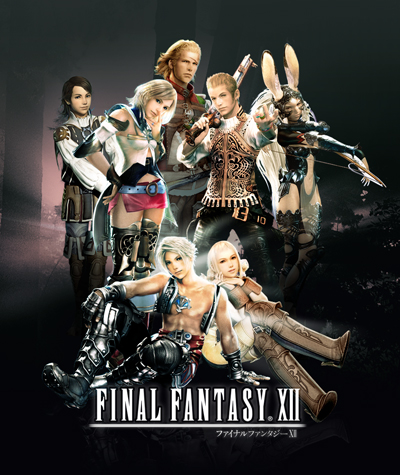
–Caveat
This article is not intended to be a comprehensive look at the game’s flaws, nor is it meant to suggest the game is above reproach. FFXII is extremely flawed. I think most fans of the game are willing to admit as much, though their reasons may differ. How the game handles race is “problematic” at best and the pacing is very chunky, particularly following Mt. Bur-Omisace, which is almost certainly when Matsuno was officially no longer in the driver’s seat. Some characters (such as Penelo) are significantly underserved and only half the cast truly have arcs. I’d argue the game still says and does more in terms of storytelling than any of the other numbered entries in the franchise, and if your argument is that this speaks less of XII and more of the flaws the others have, that is your prerogative. I’m still inordinately fond of it, however.
This is also not an article about gameplay, as it is solely focused on the game’s overlying narrative and its character journeys. Finally, this article has spoilers for all of FFXII. This game is ten, eleven years old now, but the HD re-release is only months away, so I’m putting the courtesy notice here.
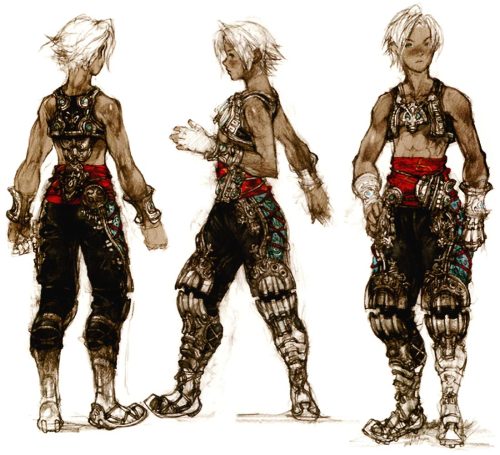
–Facts
The following are indisputable facts:
1.) At some point in development, Yasumi Matsuno stepped down from his lead position on this game. Ivalice’s creator, his focus is frequently relating his games to real world politics (Tactics Ogre, for instance, was inspired by viewing scenes of genocide in Yugoslavia). How much was “left” and how much was “forced” is a matter of some debate.
2.) Over the years, the extent to which Ivalice games, and the satellite games in their orbit such as Vagrant Story, are literally connected has been diminished and then reinstated, both by Matsuno himself and by other representatives at Square-Enix.
3.) At some point in development, Basch was to be the playable character. It is also believed that at some point in development, the same was said of Balthier, who appears to have been “finished” first. What is not ever discussed is how long these ideas were on the table. A year? A week? Thirty minutes? A few throwaway lines in an interview or Ultimania do not clarify this issue.
4.) At some point in development, Vaan and Penelo were added to provide a more traditional youth-oriented viewpoint character. It’s believed that this was because there was concern that a bunch of adults in a thorny political situation would not become a big draw for the usual FF crowd. What is not discussed is when this decision was made - Vaan’s actions drive the plot for roughly one-third of the actual story (roughly until Ashe becomes a permanent member) and Penelo was in the game long enough to have scenes deleted before the game shipped, as evidenced by scenes of her dancing in the early trailers. It’s also rarely pointed-out that young characters in FF are neither a guarantee, nor a sign of how that character will be perceived: Canonically, Cecil of FFIV is 20 (37 in the sequel!), and Cloud of FFVII is 21, but these ages are not necessarily how they’re perceived in the wider fandom of those games, generally speaking. Even in XII itself, Ashe and Vaan are only separated by two years (19 and 17 respectively) but players generally view Ashe as an adult and Vaan as a youth, based solely on demeanor.
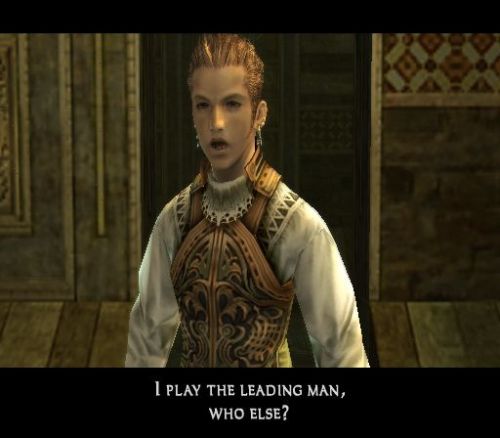
–TL;DR
- The game’s protagonist is Ashe
- The game’s viewpoint character is Vaan
- The parallel to Ramza Beoulve is Larsa
- The parallel to Delita Heiral is Vayne
- The thesis statement is Basch (& Gabranth)
- The biggest connection to other Ivalice games is shared by Fran and Al-Cid
- The narrator is Penelo
- The Leading Man is Balthier
- The character we begin with is Reks
- The characters who actually move the plot are Cid, Reddas, and Ondore
- The most important character is Migelo
If you’d consider this breakdown simplistic, that’s fine - that’s sort of the point.
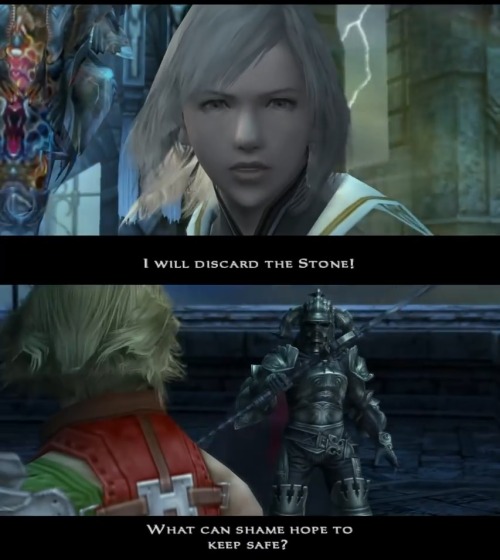
–What is FFXII about?
Because of the shifts in game development, FFXII is actually about a few things. It’s not clear how many of them were Matsuno’s doing, past the first one. However, despite the unevenness of how these ideas are distributed and layered, they do tend to intersect in ways that make the story work. XII is about, in some respect:
- Life under Imperialism, and ways to resist, the perils and necessities of radicalism
- What we do (or do not) owe to those who have fallen / the cycle of revenge
- Self-loathing, specifically regarding the choices we make when we are young - usually choices we feel are not choices at the time
- How did the world of Final Fantasy Tactics happen?
- Grappling with the influence of Star Wars on the Final Fantasy franchise
- A traditional “JRPG” theme regarding the value of free will in a world of gods
Some of these concepts are more high-falutin’ than others. Some of them are very genre or medium specific. What’s important is that essentially, all themes converge in the moment when Ashe chooses to destroy the Sun-Cryst at the Pharos Lighthouse.
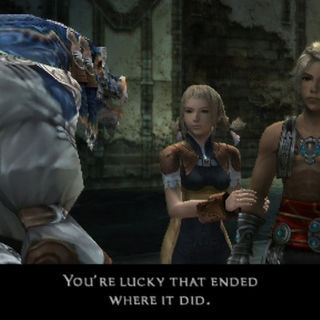
–”Migelo’s not the most important character!”
Says you.
We spend a lot of time with Migelo at the beginning of FFXII, as Vaan is taking us through tutorial stuff and we’re getting a handle on Rabanastre and the layout of Dalmasca. Once the journey begins, however, we don’t see a lot of him. What is Migelo’s role in the story? Other RPG protagonists or viewpoint characters have had parents or parental figures that are left behind, but that is their only job - to be the guardian you leave behind to prove that you’re meant to grow up. But Migelo has scenes with Vayne, the primary antagonist - the final boss - that Vaan does not interrupt. When speaking to NPC’s in town, many are talking about Migelo, more than talk about Vaan himself. Why?
Migelo’s role is also, essentially, a tutorial. As you’re learning how combat, rare game hunts, and the bazaar shop work, Migelo is teaching you how to interpret the story. His role is to introduce the theme and tone, because it’s not like other FF games. I’m not sure if “subtle” is necessarily the right word, but many elements of the game rely upon you understanding the implications of the world that you are in, rather than have the characters constantly reiterating those details to you (this begins to break down towards the end, evidence that Matsuno’s hand had left the wheel a bit).
Everyone in town has an opinion specifically of how exactly Migelo acts with the Archadean Empire. Vaan and Penelo have a two-line exchange to draw attention to this, but many NPCs change dialogue after seeing Migelo kowtow to Vayne (as he’d previously done with the guards to save Vaan at the gate earlier). There is a conflict in Rabanastre between resistance and survival. Migelo places his pride below the safety of the orphans that he looks after. The game does not offer definitive judgement on his actions, but asks that you consider that the question exists. It’s suggested he might “lose” the occasional crate and that it finds its way to Vossler & co., but unlike Vaan, who is consumed with directionless anger after the death of his brother - who uses that anger to place himself and others in danger - Migelo is willing to suffer scorn for the sake of his family in the shadow of the occupying force.
I think it’s pretty pointed that Migelo is wearing, essentially, a yarmulke in his role of shopkeeper who’ll suffer scorn for survival under oppression.
The imperialist nightmare that accounts for Dalmasca’s daily life is reinforced with the only other real town you can visit before the game gets going - Nalbina Fortress, where civilians rebuild their own town so that they can be paid by the people who destroyed it in the first place, even as that town is used as a prisoner for political dissidents. It’s a very potent metaphor for imperialism as a whole. Are these civilians wrong for doing so? The game does not decide. People must feed their families, and the insurgence - pardon, resistance - still exists.
These sequences set the tone for the varied decisions the characters must make or have already made, as the narrative focuses on age seventeen as a person’s fulcrum point.
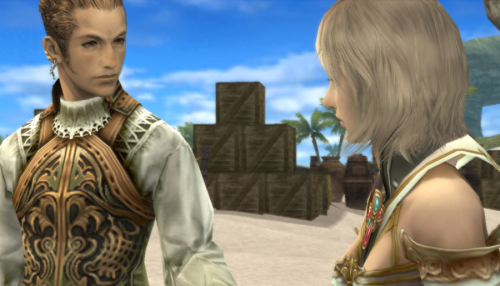
–I was seventeen, it was a very bad year
The cast of Final Fantasy XII, especially the men, each make important decisions at seventeen:
- Basch chooses to leave his homeland of Landis, and Noah chooses to stay behind. Landis is conquered; Noah resents his brother for years. Basch holds firm to his choice, as one would expect of the resolute knight/samurai character, but in rare moments his mask slips and his doubt is laid bare.
- Ffamran flees home and his role as a low-ranking judge of the Empire, taking a new name for himself as the pirate Balthier. He claims to have chosen freedom, but his every moment in the game is consumed with thoughts of the father he believed lost to madness. We cannot know for sure, but it is likely that Fran was seventeen, or perhaps the Viera equivalent, when she also chose to leave the Wood.
- Reks chooses to fight for his homeland, and specifically for his brother Vaan. He dies after torture and perceived betrayal, broken.
- Vayne murders his older brothers at his father’s orders, securing his position as heir to the throne while also losing the confidence of the Imperial Senate. He believes himself damned for his position and is subsequently willing to perform monstrous acts so that his younger brother Larsa can rule free of influence and pain (upon getting magicite infusion and letting the Occurian “heretic” Venat take a ride, this veneer of motivation is stripped away and nothing is left but the monster - it’s not clear how much of this act is motivated by his losing his only friend but he was long past redemption in any case).
As the game opens, the two heroes - Ashe, our protagonist, and Vaan, our viewpoint character, are set to face their journeys. Ashe had her decision taken from her at seventeen - her father and husband were killed and she was spirited away, and so she did not have the agency to make a choice. Vaan is now seventeen and a knot of directionless resentment and anger who has not made a choice.
In the Garif village, Ashe and Vaan have a heart-to-heart in which Vaan explains that he understands his motivations were misguided, but he does not know his place. He tells Ashe that he’ll find his direction with her - through her - and thus when Ashe’s decision comes, it is explicitly designed to determine Vaan’s fate specifically - if he will make a choice that will torture his days the way many others struggle to live with theirs.
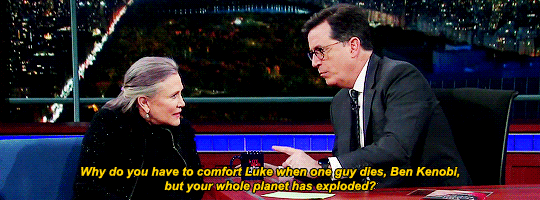
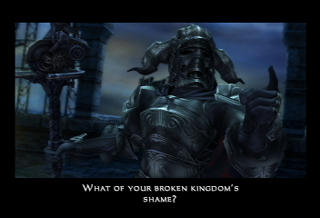
–We made a feminist Star Wars by accident
Square-Enix is not… amazing with women. They’ve had many female characters whom women enjoy quite a bit, and I’ve no intention of challenging anyone’s beloved characters. All I mean to say is that when I say “feminist Star Wars by accident,” my tongue is firmly in cheek here, fully self-aware, but that is certainly a way to read what happened.
Final Fantasy has been wrestling with the influence of Star Wars for their whole lifespan. There’s always a Biggs and Wedge, lots of sequences have liberally borrowed… FFIX quotes The Phantom Menace at the end in this bit that really hasn’t aged that well despite largely being a pretty great game. Nobody can be sure at exactly what point it was that they decided to just “do Star Wars” in FFXII - if it was a way to take what they had and make a comprehensible plot in the wake of Matsuno leaving or being asked to leave, if it was Matsuno himself using the skeleton of Star Wars so that his Ivalice story would feel more traditional to other FF fans, if it was a course-correction to Vaan’s late-addition. We can’t know, and it doesn’t especially matter. What does matter is that in doing so, they made a version that’s… better? By certain metrics. Certainly it’s about Star Wars the way that the original film is about the serials Lucas grew up with, but in having Ashe as a protagonist, the journey of the two main characters actually follows a more sensible progression.
Putting aside portrayals for a moment, in a vacuum it would make sense if Princess Leia were the one tempted by the Dark Side, right? She lost so much more than Luke did, her grief and her anger would be so much greater. At any rate, the story of FFXII is essentially a story where we watch Leia through Luke’s eyes, as she is briefly tempted and then refuses that power, which would enable her revenge.
Ashelia B’nargin Dalmasca seems to be a difficult character for much of the game’s audience… well, at least much of the game’s male audience? - to wrap their minds around. She’s wearing some ridiculous FF sex appeal clothing, and all of the game’s advertising pivots her as being very coy or demure or traditionally feminine, but in the game she’s kind of a bitch - and I say that as a compliment. Square-Enix can use that key art of her touching her nose all they want, but this is an angry woman who suffered and wants to inflict that suffering, for much of the game. The “problem” is that Ashe is not masculine, not a “man with breasts” female character, but her journey is usually one given to men. She has a love interest die in order to motivate her, and she has to learn to give up her revenge before she does something monstrous - for part of the game she actually considers genocide, until being confronted with the means to achieve it.
If many characters in XII parallel those in FFT in different forms, Ashe is the parallel for Wiegraf Folles - the hero who fell, and the heroine who almost does, both of them the holder of Belias the Gigas first and foremost.
The plot of XII echoes Star Wars more or less beat for beat as we follow desert rat Vaan and his rogue allies and wiser companion until they rescue the princess… at which point the plot still echoes the film, except the princess is clearly the protagonist and upon being rightfully restored, the focus remains upon her.
“Gamers” who bring up “who could have been the main character” are all alike in a very specific way. They all claim that Vaan is bad, and that Basch or Balthier should have been the main character based on some notes about the game’s development. But they all steadfastly refuse to acknowledge that the game’s protagonist is currently Ashe.
It is Ashe who wants to leave Bhujerba and go after Raithwall’s treasure. It is Ashe who wants to speak to the Garif to learn how to unlock the magicite’s power. It is Ashe who agrees to accompany Larsa to Mt. Bur-Omisace, who wants to go to Archades as badly as Balthier, who follows Cid into Giruvegan, who decides to climb the Pharos, who declares she will enter Bahamut and stop Vayne.
And every step of the way, Ashe is advised by men, not left alone by men, her decisions are judged by men. And in fairness to the characters, some of that is deserved. Ashe cannot bear to shatter the stone with the sword, she talks about accruing power. She is the rightful Dynast-Queen and the stone only responds to her, but she speaks in terms far beyond freeing her realm from occupation. But Ondore treats her as a figurehead and does not want her to act with her own agency, Balthier and Fran snipe at her constantly and Balthier especially cannot view her decisions through any lens but his issues with his own father. Al-Cid flirts, Vossler infantalizes, Larsa tries to hold the moral high ground, and Vaan keeps interrupting her.
“I am no false saint for you to use!”
Again and again…
“I am simply myself. No more and no less. And I want only to be free.”
…Ashe tries to reclaim her agency. Her Quickening quotes are ”I must endure” and “I must be strong” and “I must believe.”
The “insurgence” vs. “resistance” joke is a pretty loaded one, because on the one hand, it’s about politics, about how imperialism views resistance, how the narrative can be changed, but on the other it’s about attempts to strip Ashe’s identity away and give her a different one.
Ashe does not get the choice at seventeen, and so at nineteen she stands at the top of the Pharos at Ridorana and Gabranth takes the Darth Vader role, the Emperor role as well: accept the power offered, let revenge damn you. And what she sees is Vaan pick up the sword, and look to her.
The defining moment of Final Fantasy XII is but a spare few seconds as these two young people share a single look. Vaan is at the point of his seventeen-year-old decision here, and Ashe at last has the agency to make a choice. Vaan is many things in this moment - a sort of younger brother figure, in the Luke Skywalker role. Literally one of her subjects, and thus a symbol for her as queen, for how she will consider the welfare of her citizens over everything else as a ruler. As a younger version of all of these men who have pushed her, even as a younger version of herself, less far-gone in being lost to hate.
And because she’s the hero of the story, she discards the stone. And inspires Vaan as well to cast his desire for revenge aside. She inspires him so fully that at the game’s end Vaan uses Gabranth’s blade to land the final blow to help enable Gabranth’s dying redemption.
The focal moment of the story, and it does not work without Vaan there - Vaan is necessary to make the story work.
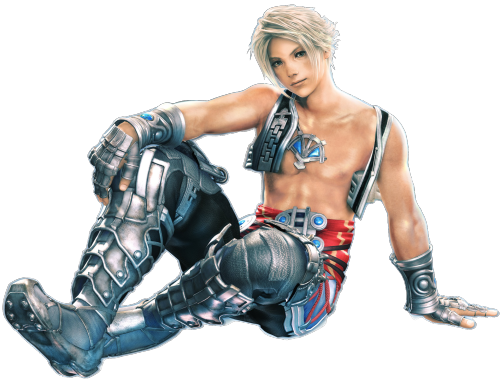
–Vaan and the male “Gamer”
If you want to know why a certain sort of game-player is so insistent upon reminding you at every moment that Vaan was not always intended to be in FFXII, I think you need look no further than the above image, which is official artwork.
There’s nothing about the above image to appeal to a straight male “gamer.” I’m a straight cis male myself, so I’ll not make assumptions as to whether anyone else likes the look.
Vaan’s abs have been a meme for a decade because of the bizarre choice in how they chose to render them in game, it’s true. In that respect, he’s always looked weird. The rest of his character design is pretty obvious, however. He’s a desert street rat, Vaan Ratsbane, and so he’s meant to explicitly reference Aladdin. The shirtless vest, the band around his waist. But this is a major promotional image, and it’s relying upon a sex appeal you don’t normally see in male video game characters.
Vaan is a viewpoint character, but he is not the protagonist. Vaan is who you control as you run errands. Ashe talks to gods. Balthier looks cool standing at the rim of a prison arena and saying fantasy-racist slurs to provoke some bullies. Basch gets to have noble speeches. Vaan provides comic relief and his most-known moment is when he claims to be someone else to attract attention.
A certain contingent of those who play games do so in order to be supplied with a power fantasy, a wish fulfillment. One would think having Vaan get the best stats and stand up to Gilgamesh and Zodiark and Ultima and Vayne would be enough, but the game does not treat Vaan as wish fulfillment in that way. And they can tell.
Cloud Strife, in the original Final Fantasy VII, is actually a scared and lonely boy who has constructed a personality around himself that appears cool, detached, and badass. Ostensibly the game is about peeling that shell back to see the the boy beneath. But the game’s style, the length of time spent on the “badass” part, and the way the spin-off media treats the character have all worked to leave the traditional gamer affirmed. They’re riding the motorcycle, they’re fighting in the Gold Saucer arena, they’re battling Sephiroth. Final Fantasy XII does not do this.
The character above is not wish-fulfillment for men in part by looks - he is not muscled, he is not “cool” the way Balthier is, and his biggest cutscene action is screaming as he stabs the enemy with someone else’s sword. He’s not wish-fulfillment in the game itself because despite his good stats, every character can play every role competently (even if in the job system, certain characters using certain jobs will be very sub-optimal), and in general viewpoint characters are rarely wish-fulfillment because every other character knows more about what’s going on than they do. Ivalice is a complicated world, and somebody needs to have it explained to them or the player will not be able to follow along, but many players hate getting explanations.
He’s more “feminine,” despite being perfectly capable at all times. It’s the lady in the pink miniskirt who does all the cool hero stuff. That’s what people hate. That’s why they always namecheck Basch or Balthier. Despite the game’s plot hinging on Ashe, the character they want to be is a more traditional male hero.
A viewpoint character is especially important in FFXII, however, when you consider that the game is not necessarily played in a vacuum.
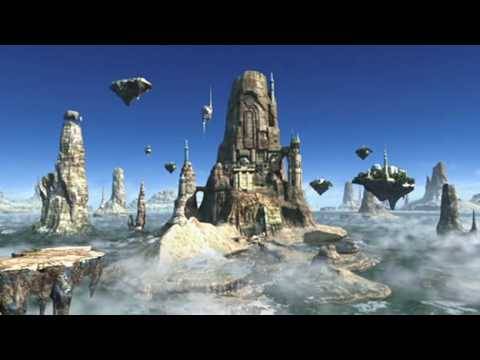
–XII as prequel
It’s hard to tell exactly what shape XII would have taken before the outside influences. It’s easy to believe that with Matsuno leading the whole way, it would be a better and more complete work, but we can’t ever really know. It’s interesting to view XII through a lens where its relation to the other Ivalice games matter, however, because many decisions have rather more import when that knowledge exists. The game plays differently when you’re playing it as a prequel, versus a game of its own.
The Final Fantasy Tactics continent of Loar exists in XII-era Rozarria, somewhere far-off to the west. And Rozarria is (if you’ll pardon the term) the “Phantom Menace” of FFXII, always lurking in the shadows, always looming over events. Many, many of the decisions that many characters make in the game are motivated by the knowledge that any provocation could bring Rozarria into the fray more actively, and in so doing cause a war that would wipe out Dalmasca completely. After all, as Migelo would tell you, occupation is monstrous, but it’s better than death. And so Rozarria becomes, in a sense, the spectre of Final Fantasy Tactics itself, always just out of frame, never forgotten. It is Rozarria in the final act which enacts the false flag operation which leads to the climax - an explicitly Dycedarg maneuver!
Al-Cid invites Ashe to visit the Ambervale of Clan Margrace when the hostilities have ceased. The “Ambervale,” of course, was the site of the final battle in Final Fantasy Advance, the game where we first meet Montblanc at a younger age. The other games aren’t forgotten.
Final Fantasy XII occurs pre-Cataclysm, and establishes that there have been many such world-ending events in the past. Out of control nanotechnology, Esper wars, all sorts of events (almost assuredly the inspiration for how FFXIV treats its Calamities). This is a deliberate tie to FFXII’s use of the cycle of revenge and hostility, but it also prompts the informed player to watch the game’s events as a sort of ramp-up to the Cataclysm. We don’t run into Ajora or Germonique here, we don’t see the Cataclysm occur, but the game is asking the player to understand the way these political battles become events that cannot be walked back, how small events can have ramifications, how sickly ironic viewpoints can be in retrospect.
- The Viera maintain their isolationism even after being confronted with matters of global scale. In ninety years’ time, the Viera will cease to exist, making this sequence a tragedy in a way it does not for a player who does not know the other games.
- Bergan (& Venat) kill the Light of Kiltias and end the Kiltian religion. As a consequence, Pharism will spread and Ajora will rise up to create the events of FFT.
- Larsa, the youngest brother, echoes Ramza in demeanor, in signature weapon, in naivety about his elder brother, only to stand a hero in the name of peace.
- Vayne may have motivations that stem from love and justice, but his actions are monstrous. Here’s a key: next go-round, note the way the word “Necessity” recurs through his story, and compare it to how Delita’s story uses the word “Endeavor.”
- We learn Ultima’s origin, we see why Zodiark is different, we form a connection with Belias.
- The Mist is introduced as a central element (inspired by FFIX, which was in turn inspired in places by Tactics), while knowing the Mist will no longer exist post-Cataclysm, which suggests all sorts of things about why the magick system is different and the world is so changed.
These things are not necessary to the understanding of the game’s story - some references to the past are even the sole provenance of the localizers (calling the naturalist “Merlose” in the Clan Primer is just Alex O. Smith having fun, for instance) - but the weight of history - and of the future - very much solidifies ideas that the game is already talking about.
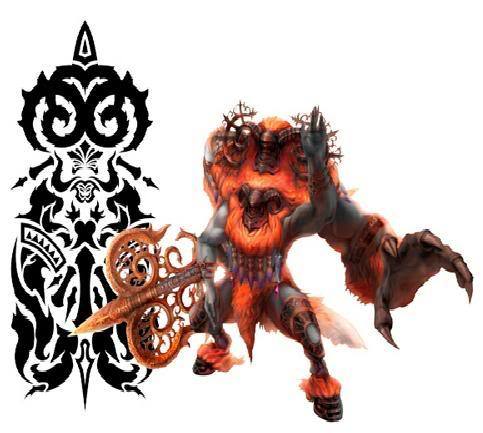
–And so
The expression “The whole is greater than the sum of its parts” could have been invented for Final Fantasy XII, because it’s quite obvious that many parts were created with different goals in mind. There is noticeable friction between those parts in many places (isn’t it weird that they get captured and then escape from the same ship twice in just a few hours of gametime? Or, I get that him being Boba Fett makes this part of the joke, but Ba’Gamnan is really sort of a dead end, huh?) but the whole of XII works, and if that’s in spite of itself, that doesn’t matter, only that it does.
And there are many valid criticisms to level at the game, but the predominance of certain criticisms, the laser-focus of a certain type of “gamer,” suggests that those issues have less to do with the game itself than with certain other reasons.
I look forward to playing The Zodiac Age in a few months, as I’ve never gotten to play the IZJS edition of the game. That is very much the draw for me, rather than the visual improvements - I find myself quite nervous about how those are going to go, actually, and not every single change to IZJS was wholly positive, even if many of them are - and it’s always nice to have an excuse to revisit one of my favorite titles. Gameplay-wise, XII was somewhat ahead of its time. It took titles like Xenoblade to catch up to what XII was doing with its west-meets-east, MMO-inspired flavor, and I’m rather fond of it despite its issues.
But mostly, I’m hoping it’s a chance for many to go back and reexamine a game that was and is very unfairly maligned, and especially so for the wrong reasons.
No comments:
Post a Comment